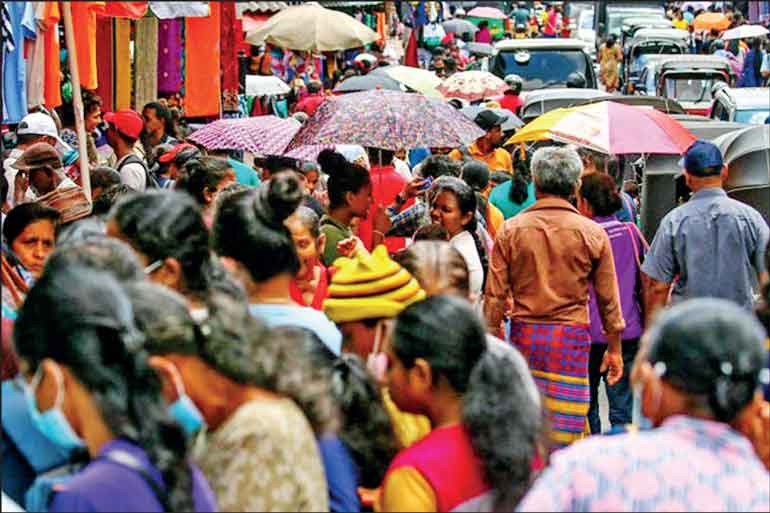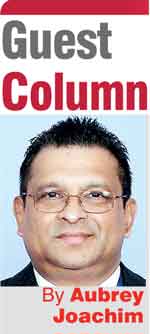Saturday Feb 14, 2026
Saturday Feb 14, 2026
Monday, 6 January 2025 00:10 - - {{hitsCtrl.values.hits}}

The first and most important phase of the renaissance of the country must be the cleansing of the minds of the people
While decades of decay will necessarily take time and a generational shift to achieve the President’s ultimate vision, the immediate picking of low hanging fruit is a promising start. Such pickings could take the form of keeping the physical environment clean, instilling road traffic and pedestrian discipline, practicing courteous behaviour towards each other and even improving public hygiene. Even something simple as a pleasant smile can evoke a sense of national wellbeing. Constant and reinforced messaging regarding bribery and corruption at the low levels supported by processes and mechanisms for bringing such acts to public attention and shaming the perpetrators
 Resemblances to the early pre-transformation days of Singapore are beginning to show up with the new regime in Sri Lanka. Six decades following Lee Kuan Yew’s cleansing and development of that nation has given rise to a world leader in a number of contexts including corruption elimination and cleanliness. More recently, it has also emerged as a leader in digitalisation. Ironically at the beginning of Singapore’s transformation journey Lee Kuan Yew set out to model his fledgling nation on the Ceylon of the 1960s. Ceylonese were invited to help with setting up administrative and other processes. To date, Singaporeans of Ceylonese descent hold important positions in the country and are held in high esteem.
Resemblances to the early pre-transformation days of Singapore are beginning to show up with the new regime in Sri Lanka. Six decades following Lee Kuan Yew’s cleansing and development of that nation has given rise to a world leader in a number of contexts including corruption elimination and cleanliness. More recently, it has also emerged as a leader in digitalisation. Ironically at the beginning of Singapore’s transformation journey Lee Kuan Yew set out to model his fledgling nation on the Ceylon of the 1960s. Ceylonese were invited to help with setting up administrative and other processes. To date, Singaporeans of Ceylonese descent hold important positions in the country and are held in high esteem.
In the six decades that followed, while Singapore scaled the heights of economic and governance achievements, Ceylon – later Sri Lanka – did not just languish but steadily descended to the lowest levels of every economic, governance and moral indicator.
On 1 January President Dissanayake – just three months in office, ceremoniously inaugurated his brainchild project – Clean Sri Lanka. With pomp, pageantry and a backdrop of the colonial styled Presidential office and modern high-rise buildings he laid out some ambitious aspirations to take his country from the depths of desolation to hopefully once again claiming its rightful place as a leader in Asia as is recorded in history. Among them his vision of making Sri Lanka the ‘cleanest country in Asia’.
However, AKD’s perception of ‘clean’ encompasses a wider remit. In his own words “This endeavour goes beyond merely cleaning up the environment. It aspires to restore the deeply eroded social and environmental fabric of our motherland. We aim to create cleanliness and rejuvenation across all sectors of society.” Harsh and piercing words which should instil guilt and shame within all Sri Lankans. After all every one of them would have contributed even in small measure to where the country has fallen. Therefore, it is only obvious that every citizen wanting a better Sri Lanka for themselves and their future generations heed his call to turn things around.
Is now the zero hour?
The huge transformational shift of a country cannot be achieved by the leader and his team alone. It requires the positive contribution of every citizen. Within the last few years most citizens have been clamouring for a ‘system change’. Is now the zero hour? If so are all those who shouted from the roof tops now prepared to walk the talk and support the President and his Government or were they just hollow slogans?
Parliamentarians, religious leaders, diplomats and the foreign press were all witnesses to the President’s proclamation. A task force of 18 including the heads of the tri-forces and persons of repute will oversee the program and intend to set KPIs to measure progress in a number of areas. Among the invitees to the launch were notable influencers such as former prominent cricketers who must be tasked with being Clean Sri Lanka ambassadors.
While decades of decay will necessarily take time and a generational shift to achieve the President’s ultimate vision, the immediate picking of low hanging fruit is a promising start. Such pickings could take the form of keeping the physical environment clean, instilling road traffic and pedestrian discipline, practicing courteous behaviour towards each other and even improving public hygiene. Even something simple as a pleasant smile can evoke a sense of national wellbeing. Constant and reinforced messaging regarding bribery and corruption at the low levels supported by processes and mechanisms for bringing such acts to public attention and shaming the perpetrators. Such initiatives may not require huge financial commitments to implement and could perhaps be sponsored by businesses and corporates. Social media can be harnessed to good use.
However, the first and most important phase of the renaissance of the country must be the cleansing of the minds of the people – in other words a mindset shift or a reset. This may be a difficult challenge given that decades of hard-wired engrained tacit behaviours are difficult to erase in the short term and the only way the nation can be cleansed over time is as generations pass on and the successive generations of the young are taught at an early age good and proper ways and behaviour. This is why a concerted effort and resources should be channelled to bring about civic mindedness at the early childhood level.
In the 1980s Singapore toddlers were taught not to litter via cartoons on children’s TV programs and in Montessori schools. Recalcitrant adults were brought in line by laws and fines. For example, chewing gum was banned in the country and those caught spitting in public were fined. Singaporeans are now a transformed society with high moral, social and environmental norms that are a part of their DNA. It has taken decades to bring about such change.
Corruption adds to total economic cost
The most prolific and serious issue that needs to be addressed in Sri Lanka right now is corruption. It is endemic and cuts across the entire society and the business world. A second thought is not given to committing the offense. While the criminal element is seen as the receiver, the giver of a bribe seems to be absolved of wrongdoing. The mindset shift has to be that both are seen as equally vile and abhorrent acts. In advanced and ‘clean’ countries both aspects attract a criminal conviction. It is not realised that corruption adds to total economic cost as it is taken as a cost of doing business and is passed down the line finally impacting everyone.
This issue needs a two-pronged approach. Leaders – political, corporate and the public service must be cleansed via harsh penalties as is the case in places like Singapore. At the other end young minds must be taught that it is wrong to bribe a teacher or a school sports administrator for favourable treatment. A child’s mind should be shaped to admonish a parent who offers a bribe to a policeman for getting off a traffic offence. That is the beginning of a collective national cleansing of the mind. Let’s not take solace in pointing out that corruption happens all across the world. Let’s get one’s own house in order.
Data and digitalisation
Appended to the President’s Clean Sri Lanka program is his mandate to digitalise the nation. Humanity is in the 4th industrial revolution or beyond. Data and digitalisation is coming to the fore. Artificial Intelligence (AI), machine learning (ML) and robotics are the way forward and replacing humans in most common public face-to-face interactions. Human to human interaction is what creates opportunity for malfeasance.
Thus if digitalisation is introduced to most public service processes – motor registry transactions, business approvals, land registry transactions, passport applications, inland revenue transactions, quotations for government contracts, court and legal processes and the like huge amounts of underhand facilitating payments – bribes – can be taken out of the process chain. A robot cannot be bribed.
In addition, smart data analytics can easily identify areas such as tax frauds and tax avoidance. Closer digital and AI enabled monitoring of the financials of businesses can eliminate financial fraud and profit siphoning. Fortunately, Sri Lanka is blessed with an abundance of smart IT talent that can develop and lead digitalisation of the nation.
Thus 1 January 2025 may well go down as a watershed moment in the history of Sri Lanka. If the nation embraces the vision of President Anura Kumara Dissanayake, the country is surely on the path of regaining its high standing not just in Asia but even further afield.
The key to a Clean Sri Lanka is cleansing of the collective national mind. Sri Lankans can do it and they must take pride in doing so.
Check out the Clean Sri Lanka website: https://cleansrilanka.gov.lk.
Those interested in giving their ideas/suggestions to the task force can send them to: [email protected].
(The writer, former Global President of CIMA, is an Australian citizen of Sri Lankan descent 0and is not a dual citizen but closely follows the happenings in his motherland.)